History of Sarah Jane (Jennie) Wood
Sarah Jane (Jennie) Wood
Born: 3 July 1882 at Cedar City, Iron, Utah, USA
Parents: Samuel Wood and Josephine Catherine Chatterley
Married: Charles Nuttall Broadbent 19 August 1903 at Salt Lake City, Salt Lake, Utah, USA
Died: 26 March 1959 at Heber City, Wasatch, Utah, USA
Jennie was born in Cedar City, Iron County, Utah, July 3rd, 1882. She was christened Sarah Jane Wood, but was called "Sister" until she was 12 years old, as there were three living brothers older than she and no sisters then. She had a friend named Jennie, and liking that name better, she was called that the rest of her life. Her brother, Franklin, and her sister, MaryAnn, had died in Cedar City; one of scarlet fever and the other one of whooping cough.
In 1882, her parents, Samuel Woodand Josephine Chatterley Wood and their family of four children, were called to join others at Bluff, Utah. This was a hard task to leave dear relatives and friends and a beautiful home to settle in a far away place among hostile Indians. They sold their home for a sack of bran and fed that to a neighbor's pig. That is all they realized out of their property in Cedar City.
Life was hard in Bluff--between the river leaving silt each spring and taking their crops, the deep sand, and the heat being fierce they couldn't raise grain, so it left little to survive on. They put cattle on Elk mountain, 75 miles away, and had to watch them continuously because the Indians would steal them; they planted crops in Monticello 50 miles away, and planted gardens and fruit trees in Bluff. They lived in a dug-out with a dirt floor and dirt roof. They would sprinkle the floor every morning to keep it hard and keep the dust down. Because of these dire circumstances, some of the men would go to Colorado to work for cash or materials and leave very few men with the women and children.
Jennie was not a robust child and required much care. She had long black braids that she could sit on and had very dark brown mischievous, loving, kind eyes. Her mother was always afraid she would be stolen by the Indians. One day, the mean, renegade chief named "Old Posey" picked her up while she was playing in the yard and took her to his camp. She was gone for days. Scouts were sent out to find out where she was and they found her in his yard. They finally made a truce to get her back by giving him so much flour, sugar, and salt pork (all very scarce, valuable commodities), but Jennie was also very valuable- they had to get her back!
When the Indians would want food, or be unhappy over anything, they would come to Bluff. When the scouts reported they were coming with their war paint and feathers, the women would dress the children in their Sunday clothes and all rush to the Bishop's house to hide; this was in case they were all killed that night. They hid the children under the beds and tried to keep them quiet for some safety. As they sat there terrified, they could see the Indians, with all their regalia, pass the windows.
A mother lit a match to find the milk for a crying baby and they just knew if the Indians had seen that light, they would all be massacred before morning and oh, how they prayed.
The dugout was replaced with a log room--dirt floor and dirt roof-—then her father built another room with a fireplace and a board floor. Jennie grabbed her brother and said, “Come and walk across it and see how it feels to your feet." These two rooms were joined by a boarded-up room which was used for a kitchen. It wasn't beautiful, but no home ever held a more welcome spirit for friends and strangers. Food was scarce, but generally shared.
Jennie liked school, and her speciality was winning in spelling matches, penmanship, and dramatic readings. A favorite was, "Curfew Shall Not Ring Tonight." She and Lell (Perkins) Lyman sang together in many programs as duets. Her brother, Arthur, was always pulling tricks on her and tattling to her father. Once, while she and the girls were riding the horse, Arthur and his friend took a whip and struck the horse. Away it went running and they all fell off. Jennie went back, picked up the whip and slung it-—hitting Bert Redd across the eyes. The next morning Arthur told his mother to go see Bert as he wasn't well. The mother was "Aunt Jody"-—the only nurse in Bluff. She went and found Bert's eyes swollen shut. When she got home, Jennie got it.
A new girl came to town named Mary Lyman. She sat in front of Jennie in school, and Jennie twisted all the buttons off her dress. She was just too good to resist.
While in the seventh grade, Jennie and Mary were told if they studied hard, they could graduate in the spring by putting the seventh and eighth grades together. This they did, with high honors.
Jennie worked away from home when she was twelve years old for the Adams family. She scrubbed floors, did all the dishes, washed diapers and clothes, tended children, and helped with meals. She received $1.00 per week. Then, she worked for Caroline Redd and family. Caroline was in bed with a new baby and there were three other children. Jennie did all the washing (turning the washer by hand), all the cooking, housework, darning, and tended mother and babe; she received $2.00 per week.
She had happy times-—lots of beans, parties, dances, pals, and plenty of work. One young man repeatedly asked her to go home with him, and she would always say "No". One night, after orchestra practice, he asked if he could carry her mandolin home - she said "Yes". He took it and she went the other way with the girls. On arriving home, the mandolin was in the picket fence.
Vilate Elliott and Jennie Brimhall, her teachers, urged her to go to the Brigham Young University. She thought it was an impossibility, but somehow her father raised $21.00 for her tuition. Provisions were put together and she went to Provo and lived in "Riddle Row" on 3rd East and 6th North in Provo. She met and had many friends, but missed many parties because of her clothes. She loved school--kindergarten work especially. She received much help in sewing, but art was always a bit of a problem.
Jennie attended BY Academy (High School) in Provo a member of the class of 1903. She graduated with a Special Certificate in S.S. Kg. Dep
When she left home for school, a new teacher was coming to Bluff. The girls said, "You'll be sorry, we'll get away with him." Jennie said, "Well, we'll meet on the way and I'll ask him to wait for me." Somehow, somewhere, they passed like ships in the night and didn't meet. He made a wonderful record as a teacher and a singer. His school closed before the B.Y.U., and her father sent some money with him to her for train fare to Thompson Springs when school closed.
Father (Samuel Wood), really thought Jennie was ok and told this teacher, Charles N(uttall) Broadbent, so. Charles had graduated from BY Academy in May 1899. Charles went to see them at Riddle Row and took the money and wondered why her father was so mistaken.
At the close of that happy year, yet sad one, Jennie's beautiful sister Bernice, seven-years old, had died just before the close of school. This was a hard trial for her parents. She was the youngest of ten children and was a joy to all. The San Juan students went by train to Thompson Springs where Brother Decker met them taking a load of freight to Bluff. It took them eight and a half days to make the trip through the deep sand and heat.
Jennie worked hard all summer, but could not make it back to school that fall. Mr. Broadbent came back to Bluff to teach again, boarding at Aunt Emma Wood's home. He was fond of her parents and came to offer sympathy for the death of Bernice. After visiting awhile, mother asked Jennie to take him to the orchard for some fruit. They got peaches and delicious grapes. On returning, her mother said after he left, "Don't you think he is a nice man?" "Yes,' she replied, "but, I wouldn't marry him if he was the last man on earth. He thinks he is too smart." He was a perfect gentleman — neatness itself— good church man, good speaker, and singer. After awhile, they had several dates, which pleased her parents. Jim Decker came home from the "Y" because of the death of his father. He asked if Jennie intended on continuing to see this school teacher. Jennie replied, "Yes, as long as he is willing." The boys said they knew Jennie liked Charles, because he was the only man she hadn't played a trick on.
A terrible epidemic of diphtheria broke out in this community; schools had to be closed, and there were many deaths. Mr. Broadbent returned to Provo and finished the year in Lehi.
Jennie went over to Verdure to work-—forty miles north of Bluff. While she was there, she received a letter from Charles Broadbent asking her to marry him. She then went home to consult with her folks. Her father said that he should work for her for seven years, and Kate spoke up and said, "Well, I won't be Leah!"
By fall, she decided to go back to school at the "Y". Mary Lyman had found her a place to work for her board. Her requirements were: get breakfast for ten boarders and four of the family; do dishes, and clean the soot from the cook stove. After school she was to clean rooms, scrub floors, do a million dishes, and wash and iron — but, she WAS back in school! It was a hard year — six months and no money. She picked up stubs of pencils, and got down to one pair of underwear, so would wash them at night and dry them in the oven. Finally, time came for graduation. Serena, Charles‘ sister, gave her a piece of cloth for a dress, and Aunt Chana sewed it for her. A teacher, Susie Whittaker, gave her a bouquet of pansies, so when she marched with the class for her diploma, she was not ashamed.
At the end of school, her father somehow had gotten $10.00 together and sent it to her to come home. She worked out during the summer and at home getting ready for her wedding, which was August 19, 1903 in the Salt Lake Temple.
Charles had taken a position at Lake Shore (south of Spanish Fork as principal of the schools. They moved into two rooms in Brother and Sister Bower's home. Jennie's mother had come up with her to be married and to help out. Charles was so busy getting things in order for school to start that Jennie and her mother went on the honeymoon to Cedar. They spent two weeks there, then she put her mother on the train to go home. Jennie never forgot the lonesome sound of the train whistle on that or any other train.
The successful school year ended and Charles was offered the principalship again, but decided to go into the mercantile business with his brother Joseph in the Passey store. They moved to Provo and lived with Grandma Broadbent. Charles brother, Tom, sister, Serena and her husband, Hyrum Vance, lived there also. Serena and Jennie were both pregnant. A son, which they named Verd Nuttall Broadbent, was born July 27, 1904, and another, Clyde Wood Broadbent, was born November 14, 1906. They were still with Grandma Broadbent. Things were going pretty well, when on the 8th of November, 1907, a call came from "Box B"--which meant a mission call. They were never asked if they could go, but when would they be ready to leave. They had now saved $4,000 to buy a home, but decided it would go for Charles’ mission.
This little family took the train to Thompson Springs, then went on to Monticello to live with Jennie's mother while Charles was gone. The second year of the mission found that it would be necessary for Jennie to go back to teaching. She recertified at the University of Utah in the summer, and began teaching in Bluff that fall to help keep her little family. The children had to stay with kind neighbors and friends. The business they had been in had gone bankrupt and they never got another penny out of it. This is what they had arranged to take care of the family while Charles was away. On the day of his release (about Dec 4, 1909) from the Northern States Mission, Charles received three letters: one from the Mission President commending him for his excellent work and releasing him; one from Jennie telling him his father-in-law was dying; and one other telling him they had lost every dollar they had put into their business. A convert, Sister Titze, put up a lunch for him and when he opened it, it had $30.00 to help him to get to his family. Many years later, she came out to visit the Broadbent family and Charles put a check for $30.00, plus the interest it would have earned over the years, under her dinner plate.
Charles arrived in Bluff on December 24, 1909, and spent the holidays there. He left Jennie to finish the school year out and he came on to Provo to see his mother who had gone on to Heber City to visit his brothers, Sylvester and David. While there, Joseph R. Murdock offered Charles a job in the Wasatch Wave Printing office. Knowing nothing of the printing business, he said "No", but then he hardly had a choice, so he went to work. On January 10, 1910, he became Editor and Manager for the Wave Publishing Company and was there for thirty years.
Jennie and the boys went to Heber in May, 1910. They prepared to buy the old Watson home. She said they could have the place and pay for it when they could. The people loved Jennie for she always brought happiness in the door with her.
The family grew to eleven children, namely: Verd Nuttall, Clyde Wood, Charles LeRoy, Marden, Josephine, Milton, Keith, Jennie, Alice, Thomas Ray, and Norma Jane. Neither Charles nor Jennie was ever too busy to accept their church callings. They were never without one. Among other positions, Charles was Stake Clerk for twenty-seven years, serving with three Stake Presidents. Jennie was a teacher in all the auxiliaries, Primary President, and Relief Society President (three times). They also both worked in the M.I.A. so long that each, in turn, was made an honorary Golden Cleaner and Master M—Man for their life-long service and contribution to the youth. They instilled by example to their children, that you never turn down a calling from the Lord -—somehow, you will find the time and energy needed for that position.
Life was busy and bustling during the next years at the Broadbents what with church work, children growing up, those bushels and bushels of food to be canned, cows to be milked, the piles of washing and ironing, the farm and community work, the county fairs, P.T.A.'s, etc. etc. There was hardly a dull moment; you didn't know what to expect next. But Jennie with her keen sense of humor took her family through many a trial. She was such a fun person--parties were forever being held at her home, and she was the life of the party. Many is the time she would have a sleigh-riding party for the whole school room of thirty children and the teacher, and then come home for a bowl of chili and hot chocolate. At one of these occasions, her daughter, Alice, broke out with the measles and sure enough it went through the whole class. Jennie would pile on a sleigh and go down with the best of them. Once while riding on the bobsled with Clyde, he cut some "shiners" on main street and threw her off. The policeman came up and said, "Don't you know you're not supposed to be here on Main Street?", and Jennie quickly answered, "Oh, we're just cutting across to get to Lindsay Hill." The others were dying laughing! On another occasion when the girls came home from school, they found their mother gagged and tied to the kitchen chair. When she was let free, she told them the boys had done this while they cut and ate the pies she had made for supper. "Isn't it nice they like my pie?" she calmly remarked.
Somehow, as the years rolled along, with the Wave office, the farm they had purchased, good management and hard work, each of the children was afforded a college education and some went on missions.
Jennie and Charles taught a missionary class for some time in the Heber Second Ward, and in 1947 were called on a mission to California. This was a dream come true for Jennie. They were called for six months and it turned into fourteen months. The last three were spent doing temple work at the Mesa Temple. Charles was a guide on the grounds and loved every minute of it.
In 1950, they made a journey back to North Carolina to see their son, Ray, marry Edith Stovall. While Ray was there, he was Branch President, so now he and all the boys had had missionary experiences.
On August 19, 1953, a very unique, pleasant occasion was held which included Charles, Jennie, Hyrum and Serena; these four celebrated their Golden Wedding Anniversary together. They were married fifty years previous on the same day. All of their living children and families were there to help them enjoy this eventful day. Hundreds of friends and relatives came by that day; many wrote, or phoned, or wired congratulations. It was a gala affair.
Also, in 1953, Jennie Broadbent was chosen as Wasatch County's "Mother of the Year." The program was held in Salt Lake City and Crissie Duke, a true friend of Jennie's, gave her tribute and told of her many accomplishments.
Jennie loved to travel, make new friends, see new places, and have a fun time. This time, the chance came to go to Hawaii on a tour--now, to get Charles to go. With persuasion from his family they sailed from Los Angeles on the 16th of May. Included on this tour were also her sister Kate, and his brother and wife, Sylvester and Rita. This was the last trip they would ever take together. They had one wonderful time! Chee, a native Hawaiian and tour director, paid special attention to them and everything was so wonderful. She found out that Charles was about to have his 84th birthday while there, so she arranged a Hawaiian birthday party for him--a party they never forgot. They loved sailing on the "Leilani", were excited about everything there, and loved the flying home.
Shortly after returning home, Kate became very ill and Jennie spent much time being with her. Later, Kate died of cancer. Jennie was also having some problems with her heart--little attacks at first, then they got increasingly worse so she was taken to the hospital in Salt Lake where her children would take turns staying with her. Then, she was taken to her son Ray's home where he, as a doctor, could help and watch over her and make her as comfortable as possible--which they surely did. On March 26, 1959, she died at their home. She died as she had lived-—thinking about Charles and what he would do without her. Her burial services were held on March 30th in the Heber First Ward Chapel.
She had lived and laughed and loved, had a profound love of the gospel, and left to each of her children a house full of memories to carry them through their lifetime. To know her, is to love her. >
Source:
Samuel Wood Family, December 1982. John M. Wood Chapter.
News article regarding BYA Commencement 1899
 Wood.jpg)
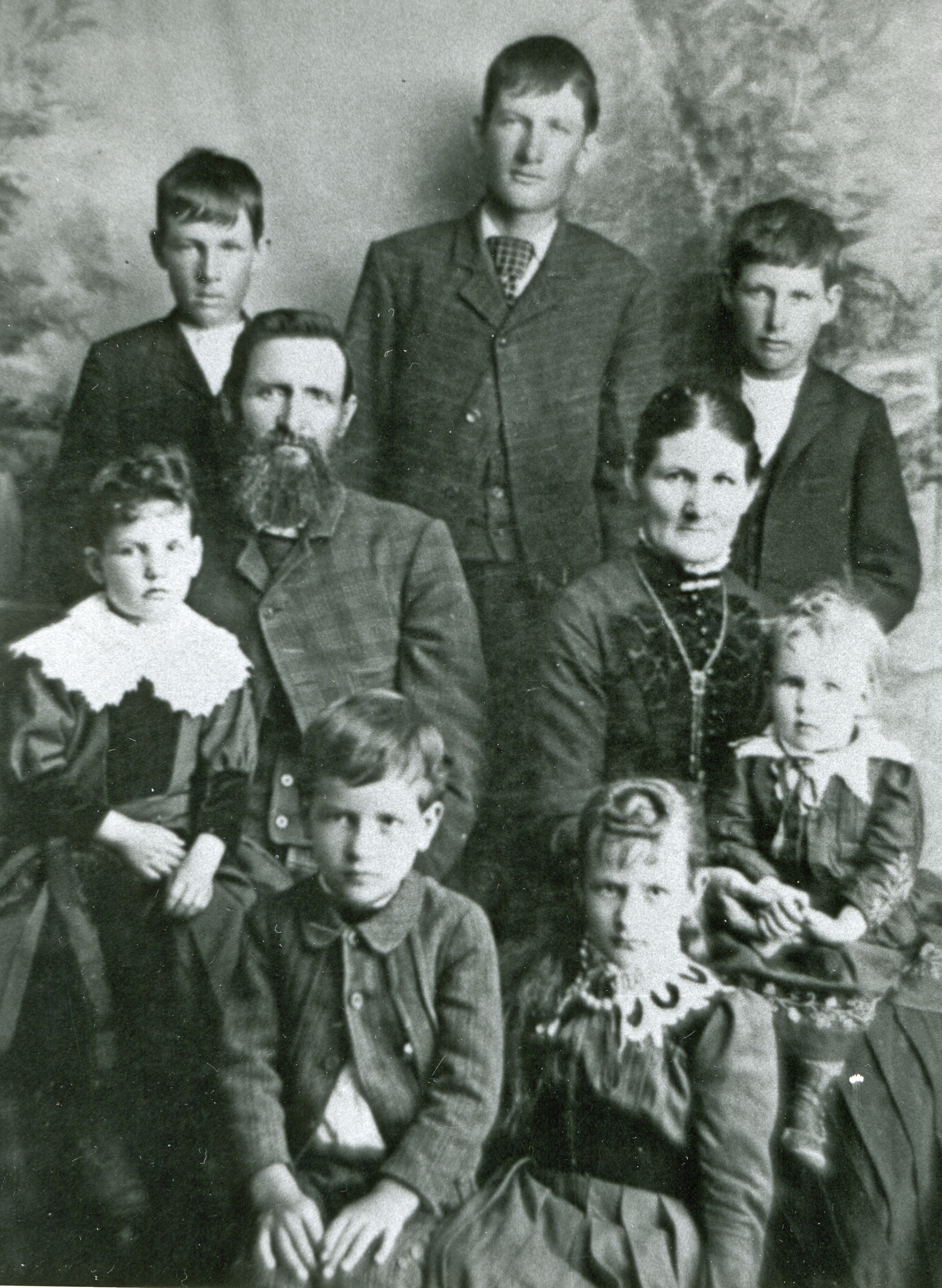
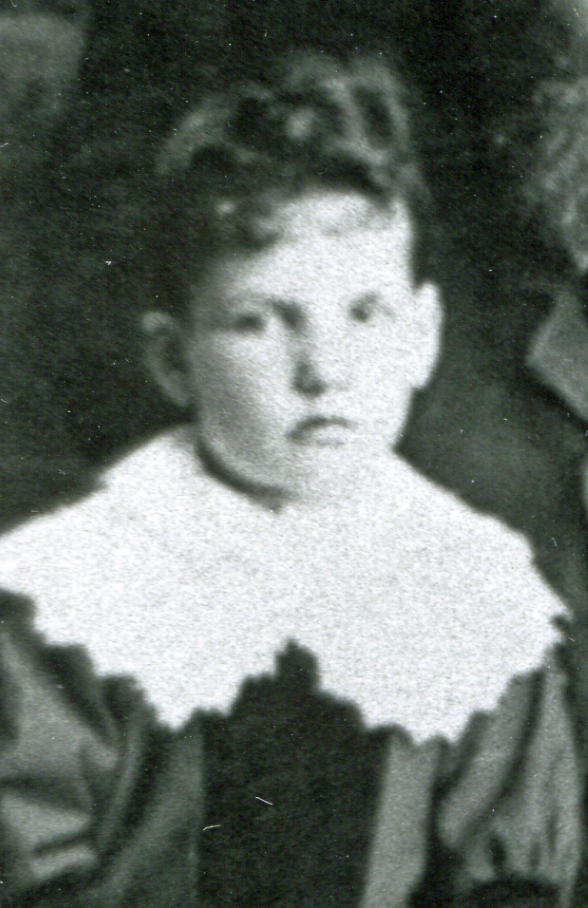
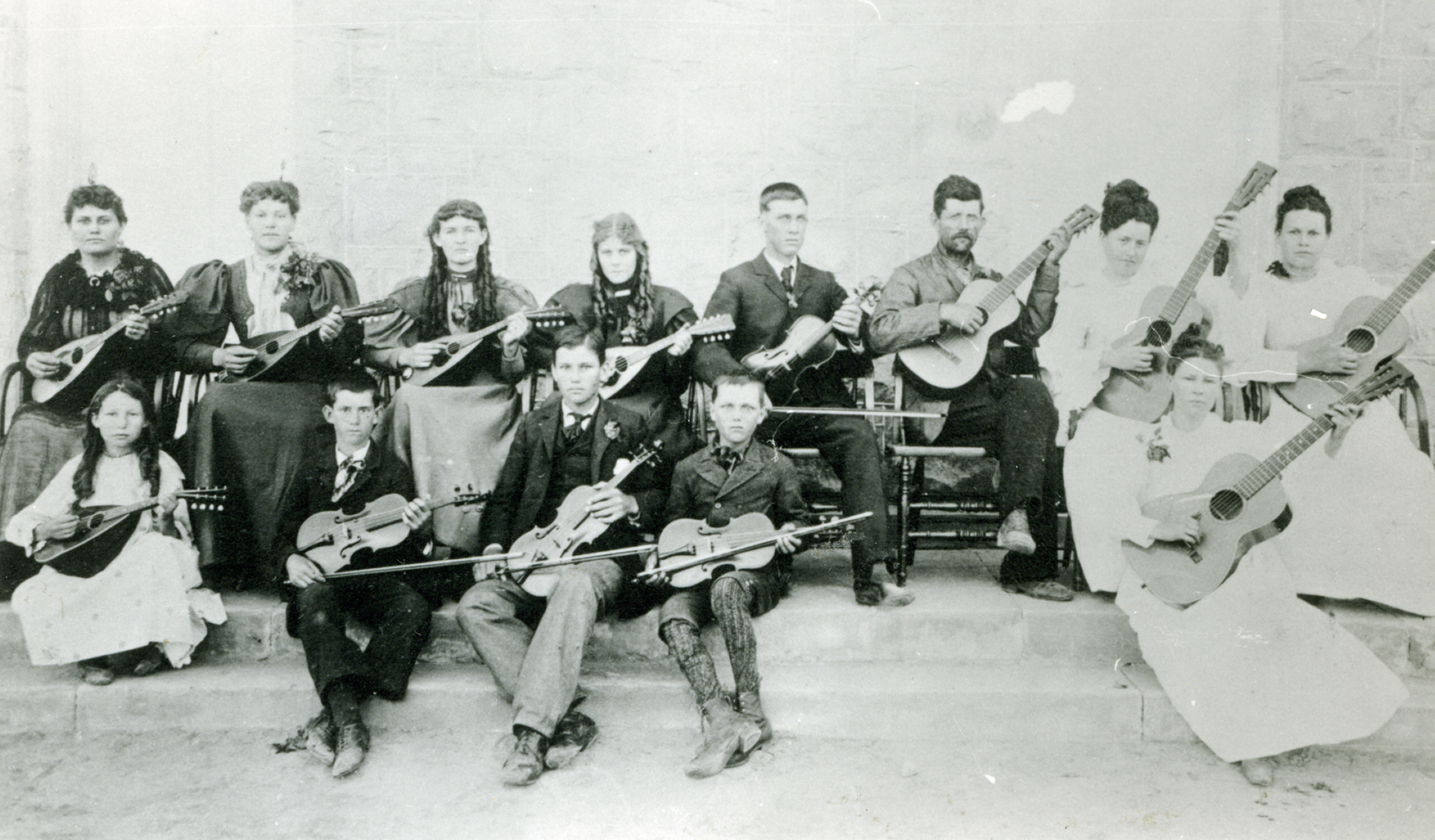
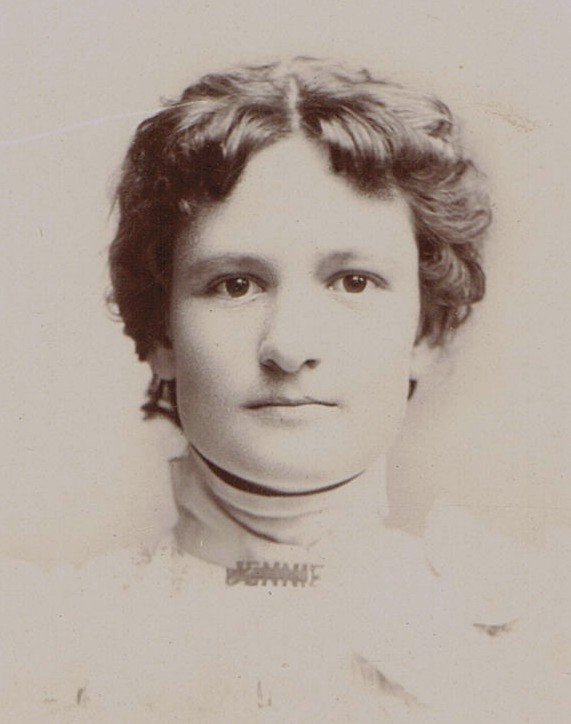
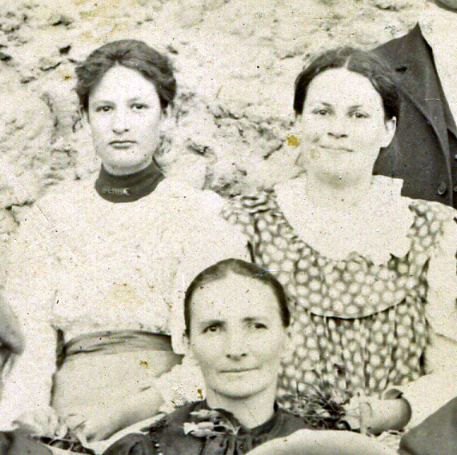
 Charles (Broandbent) Jennie wedding.jpg)